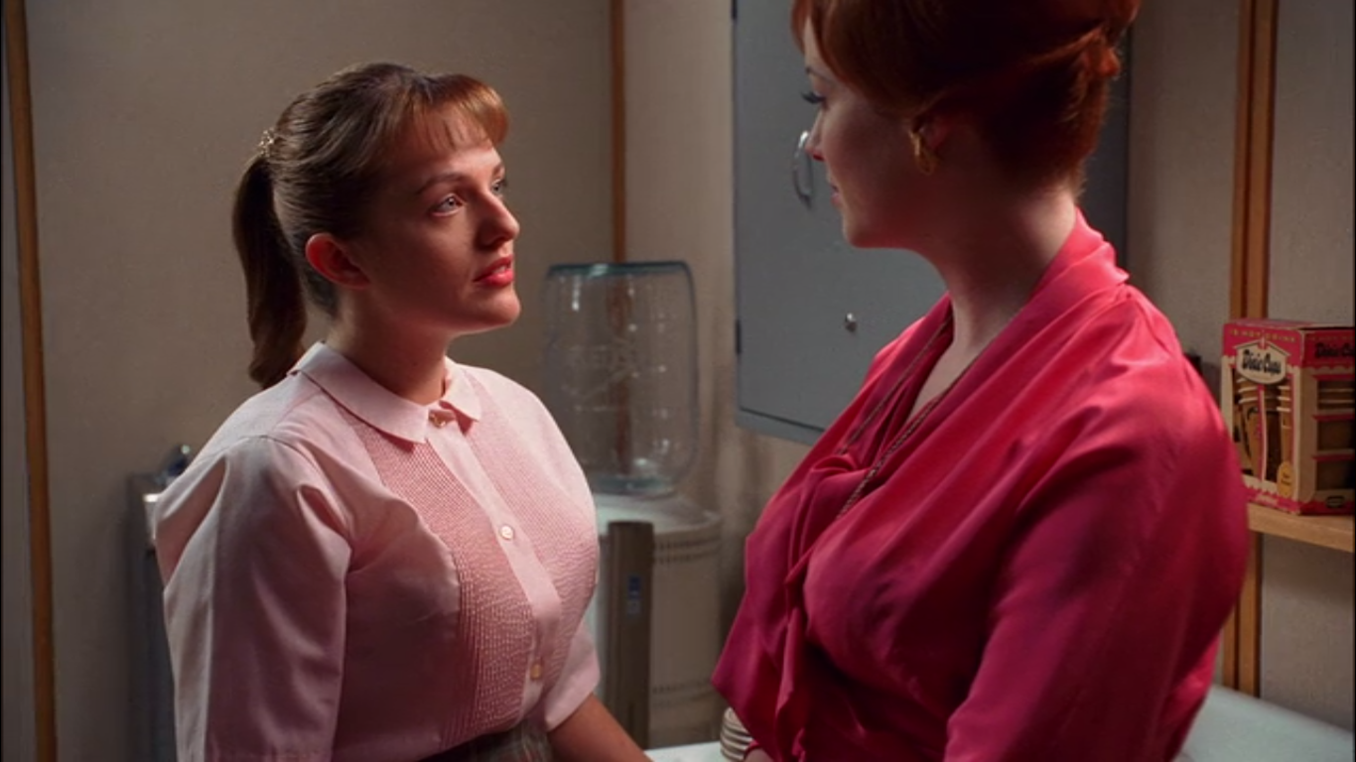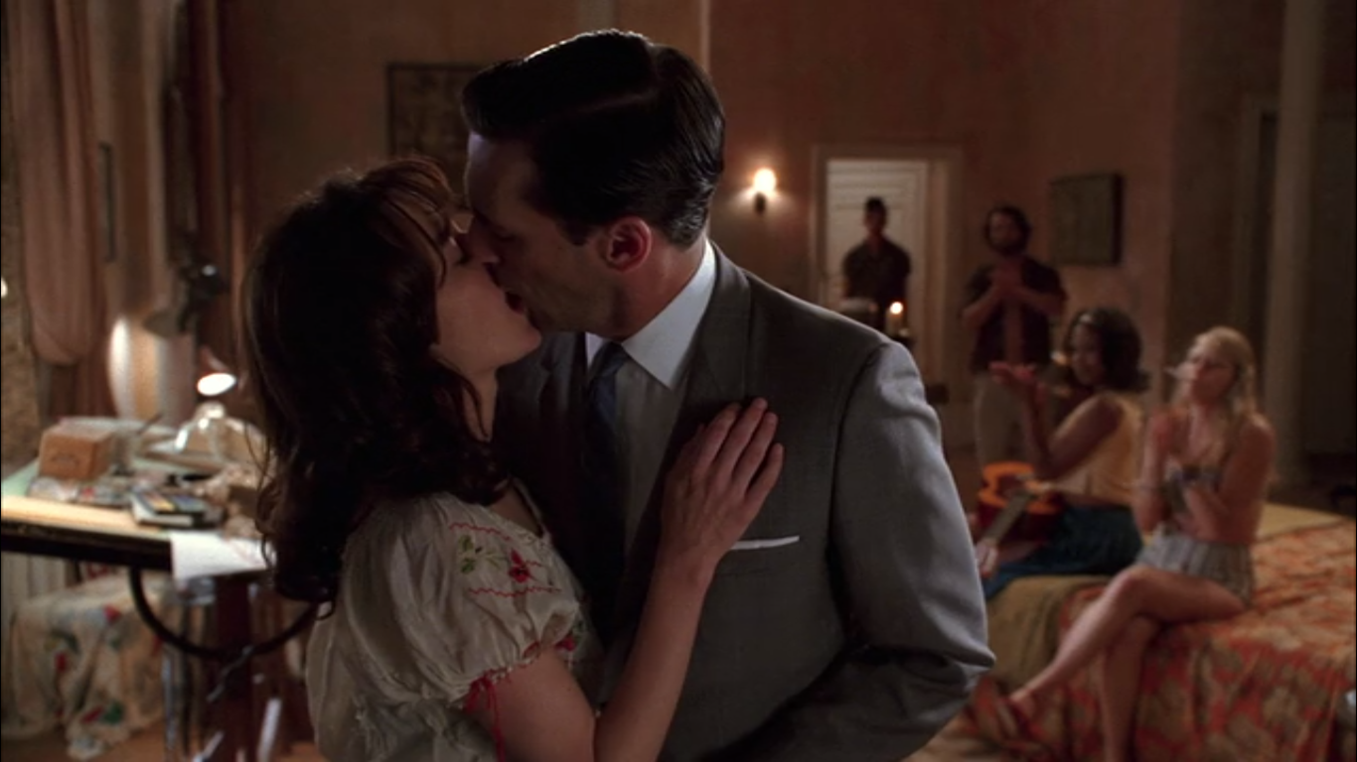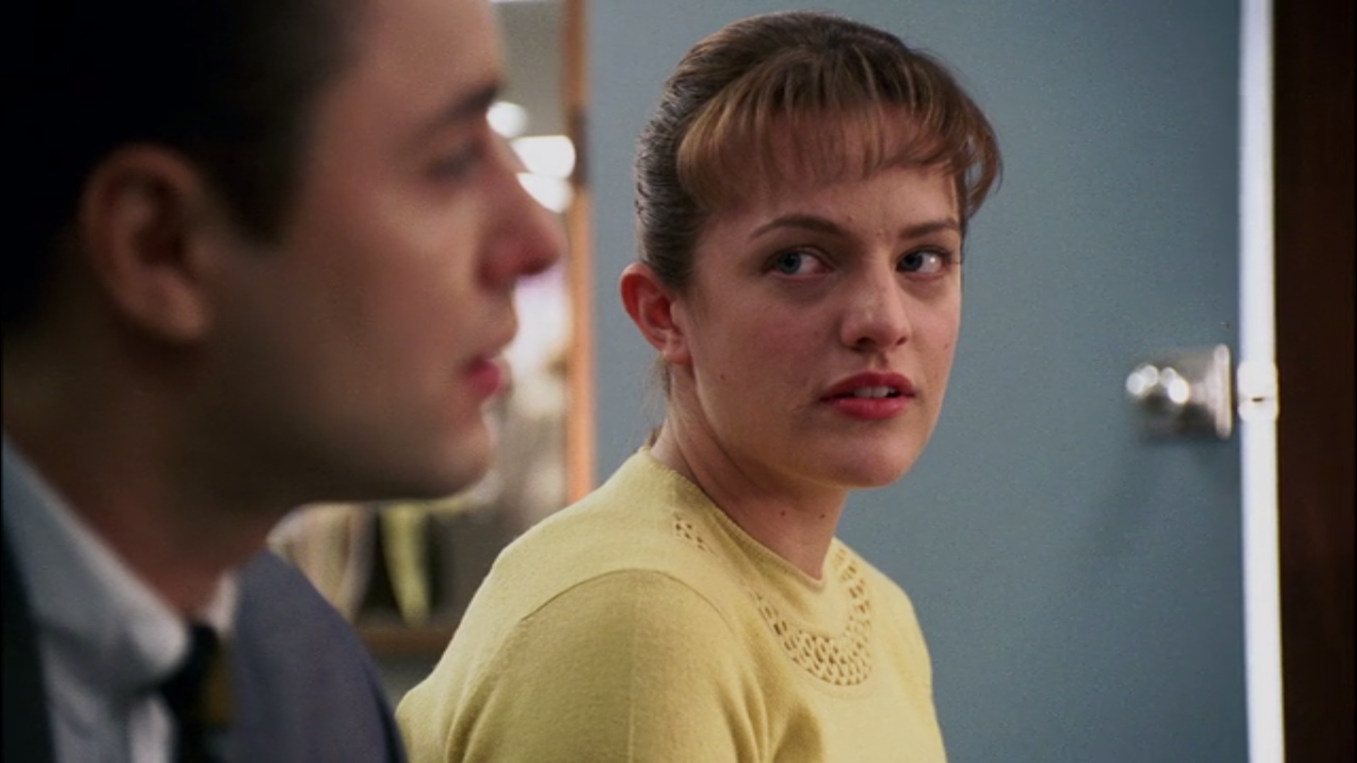(S P O I L E R S)
In
which she wanted me to be beautiful so I could find a man. There’s nothing wrong with that.
Just as long form television
dramas sometimes pause at the ¾ mark of their season, doubling back a bit on
old themes and motifs in preparation for the home stretch, so too did my trimester
of Mad Men/Great Gatsby/In the Lake of
the Woods also seem to slow down a bit around the time that we watched “Shoot.” During the final class period of each year, I
always asked the Sophomores to choose their favorite and least favorite part of
the past eight months. The most popular
answers for the latter were The Bell Jar
(surprise, surprise), the Raymond Carver documentary To Write and Keep Kind that we watched before reading Short Cuts (this one still boggles my
mind, as it’s a fairly inoffensive hour-long film)…and writing the second
trimester Mad Men essays. We’re talking some 100% all-natural loathing
of those essays here. And I understood
their frustration. Part of the challenge
of those assignments was to examine changing materials through the same basic
lens week after week; the repetitive nature and all of its inherent emotional
fluctuations was a big chunk of the lesson.
And hey, I had to grade them all each week, which wasn’t always
necessarily fun. (Okay, the only real
fun I had in grading them was the awesome insights of the true believers. And the improvement of people that were
working really hard.) But huge life
lesson everyone: rewarding work doesn’t necessarily have to always be fun. (Agh, I’m slipping back into teacher
speechifying mode. Sorry.)
And to be fair, the other reason
why things started to slow down was just as often In the Lake of the Woods.
Tim O’Brien’s book is sort of an odd bird in the annals of my teaching
career. When I first taught it, most
students loved it. I had several who
claimed to never read books race to finish it before the rest of the
class. But in four years of teaching it
at the Sophomore level, its track record was somewhat dicier. To this day, I still know survivors of the
Sophomore experience who adore the book.
But there are also probably former students of mine who still refer to
it as “that stupid book about the guy and his missing wife.” And don’t get me wrong: for as tremendous as
the book is, it’s also incredibly depressing.
Powerful, yet very very depressing.
Stick your head in the oven depressing.
I always figured that watching Mad
Men each week would at least provide a dose of levity and humor to Woods’s bleak voyage through the heart
of darkness. Of course, that might’ve
discounted the students who thought that the show was also unremittingly bleak. And did I mention that we read this book
during the middle of January in Columbus, Ohio, a time and place fairly
conducive to giving up most hope for humanity?
(I won’t go into it much here, if
for no other reason than you, my dear reader, probably want to get to more
discussion of “Shoot”, but I firmly believe that some of the growing
disenchantment with Woods was also
due to that much discussed and often true millennial dislike of deeply
challenging subject matter. And by that,
I mean literature that doesn’t work overtime to make readers feel better about
themselves, or reconfirm what they already know. It sounds cliched, but each year of teaching
seemed to bring with it more and more students who were increasingly resistant
to opposing or unfamiliar points of view.
I could be sardonic and say “Thanks parents for instilling a sense of
hyper-inflated ego in your offspring.” I
could be self-deprecating and say that I’m starting to sound like Roger
Sterling in “Red in the Face.” I could
also note that a great of deal of my former students are pretty awesome
thinkers and human beings. Or I could
just shut up and say maybe we’ll get back to this point later.)
So smack dab in the middle of
this often dead period of the class lay “Shoot.” Much like “Red in the Face”, it follows an
emotionally draining episode with something more self-contained, though no less
instructive. And it’s appropriate that this
episode is directed by Paul Feig, who would go on to helm Bridesmaids, The Heat,
and the upcoming female-centric Ghostbusters
reboot. For in large part, “Shoot”
deals, once again, with the crushing expectations that society foists upon
women, and the residual damage those expectations perpetuate.
Throughout Season 1, we’ve seen a
steady recounting of the frustrations that plague Betty’s life. “Shoot” provides us with a quietly
devastating encapsulation of them. For
the first time, the modeling career that she gave up for domestic life with Don
is brought into sharp focus, her stories of shoots in Italy filled with a sense
of dreamy elation, her delight at being given a second chance a rare marker of
true happiness for her. But even this
moment of triumph is marred by the harsh realities of her personal and social
standing. Jim Hobart may flatter Betty
by calling her “Grace Kelly” and offering her a gig in McCann Erickson’s Coke
campaign, but he’s merely using her as a pawn to lure Don to his agency.
The modeling job itself may be an
ego booster for Betty, but it’s also a reinforcement of society’s cage, an acid
observation on women’s proscribed roles.
Mad Men has always been a show
that deconstructs the seductive allure of advertising through the seductive allure
of its own form. The show’s lush
cinematography, production design, and costuming provide such decadent pleasure
for the viewer that it can easy to forget how reflexive these features can
be. Witness the beginning, middle, and
end of “Shoot.” The opening scene
depicts an edenic summer tableau, with a radiant Betty trimming the hedges, Sally
and Bobby playing with their dog, and their next door neighbor benignly waving
to them as he releases his pet pigeons.
But by episode’s end, we’ve seen the neighbor threaten to shoot the
Draper’s dog after she attacks one of the pigeons, and a once again radiant
Betty returning to the yard to fire at those pigeons with an air rifle (as much
the move of a protective lioness as a symbolic lashing out at another seemingly
free being who must always return to their cage.) The Coke photoshoot is almost a sick,
Technicolor mockery of these two scenes, gorgeous, yet completely artificial
(there’s a bit of a nod to the doomed symbolism of the McCann shoot in the
final scene of the Season 5 finale.)
Betty seems to move between worlds in this episode, but she must always
portray the perfect mother and housewife no matter what. Even during her session with Dr. Wayne, she
admits that her mother only wanted her to be beautiful to ensure her marital
prospects, and viewed her modeling career as the equivalent of prostitution
(shades of Pete and his father in “New Amsterdam.”)
Don’s role in Betty’s unhappiness
is, for once, somewhat restrained. There’s
a sense of tragedy in how his courtship of her led to her giving up something
she loved, but there’s also an old school sweetness in a lowly fur company
copywriter successfully wooing a gorgeous model. He actually supports her choice to model for
McCann Erickson, and Jim Hobart’s manipulative attempt to seal the deal by
sending him proofs of Betty’s shoot so offends him that he finally turns him
down (although that’s a complex scene; more on it in a bit.) When Betty lies to him at dinner about her
departure from McCann, he consoles her by telling her “I would’ve given
anything to have a mother like you.” It’s
another great moment by Hamm, as he drops the standard Don-isms for moment of
genuine love, made even more resonant by our knowledge of his terrible
childhood, tossed from one unwilling mother to another. But as always, there’s a darker edge to it,
as his attempts to convince Betty that she’s a fantastic housewife only last
until 1pm the next day, when her returning depression leads to her front yard
target practice.
I’m currently in the midst of
revisiting Season 2 for the first time since I originally watched it, so some
of my observations might be getting a bit muddied from here on out. But watching “Shoot” right after the Season 2’s
“A Night to Remember” has given me a new appreciation and sympathy for
Betty. In later seasons, she’ll become a
remarkably cold person, but in many ways it’s all because of the
psychologically traumatic blows inflicted on her in these first few seasons. By “A Night to Remember” (in which she’s once
again expected to play the perfect housewife, and a representative for all
housewives for the Heinekin campaign), Betty is completely broken, her confrontation
with Don (after she can’t find any physical evidence of his affair with Bobbie
Barrett) a heartbreaking depiction of a shattered psyche. The tragedy of her arc is that in trying to
liberate herself from Don, she ends up becoming him: a damaged and sensitive
person who chooses to guard themselves against the cruelties of the world by
hiding behind a steely veneer.
Betty isn’t the only woman to
deal with nearly overwhelming societal pressure in this episode. Once again, Peggy must run the Sterling
Cooper gauntlet, damage coming from all sides.
After a dress rip forces her to wear one of Joan’s larger outfits in its
place, Paul acidly notes that “She’s having a very bad freshman year” and Ken
calls her “A piece of fruit that went real bad, real fast.” And in trying to reassert her dominance in
their relationship, Joan chides her as having had too much lunch, and not
taking advantage of her sexuality to get ahead.
This is one of the first explicit mentions of Peggy’s weight gain, and
the cruelty of the office expectations for female beauty is stunning; she might
be slightly heavier, but there’s nothing unattractive about Peggy. But like Betty, she also claims a moment of
liberation and fires back at Joan, memorably telling her that men like her “because
you’re looking for a husband, and because you’re fun…and not in that order.” Joan’s only recourse is to insult her
virginity, but Peggy’s refutation of that jibe leaves badass Joan momentarily
shaken. It’s yet another chapter in the
origin story of Peggy Olson: Career Woman; the killer look in Elisabeth Moss’s
eyes when she tells off Joan is like the awakening of a sleeping giant. (There’s also the great moment where Pete,
fed up with the boys insulting Peggy, coldcocks Ken at the end of the day…although
valor toward women is subsumed by Paul spinning it as a gateway for male
bonding.)
But you can’t blame Joan too much. After all, she’s just as much a victim of
society’s expectations as anyone. She’s
just chosen a path in which she exploits those expectations to her own ends,
even though her victories are limited at best.
But in an office like Sterling Cooper, limited victories are
coveted. Look at Pete’s secretary
Hildy. As I noted in the essay for “Red
in the Face” she has a great moment when she shoves down Pete’s phallic hunting
rifle. But in “Shoot”, she’s subjected
once again to Pete’s attempt to be as suave as Don, as he tries to get her to
celebrate with the boys and him. Her uncomfortable stare lends the whole things
the fetid air of a frat party about to go terribly wrong.
The other great concern of shoot
is Don’s recruitment by McCann Erickson.
As I mentioned before, the climactic scene in which he rejects Jim
Hobart’s advances is one of great complexity.
He seems to be genuinely offended by the usage of Betty’s photo proofs
as bribe, but those idealized photos also seem to strike a deep psychological
cord in him, their existence a sordid reminder of the artificial nature of the
Drapers’ marital bliss. As we see
throughout the series, Don does have a deep (if often misplaced) sense of
loyalty, and his decision to stay at Sterling Cooper is partially motivated by
that feeling. But as will become readily
apparent by season’s end, working at a small firm, with no contract and little
oversight, creates the perfect conditions for a man scared to death of his past
catching up with him.
In conclusion, we go to the
now-standard odds and ends:
*One of the biggest laughs in “Shoot”
occurs during the Pete/Ken fight. As
they brawl in the background, Don and Roger emerge in the foreground. Their dry reaction (“Roger: Drop you at the
station? Don: Sure”) is priceless.
*Despite being the head of one of
the largest ad firms in the city, Jim Hobart would disappear from the plot
after this episode, although he would return for a key cameo in Season 7.
*This Week in Pete Campbell’s
Preternatural Greatness: Pete devises the canny political strategy in which
Secor Laxatives buys up all the non-Nixon television ad space in key election
swing states, thus relegating JFK to the radio (where, as Bert Cooper puts it,
his pretty face won’t be an asset.)
*”Secor Laxatives. You know I have to talk to those people. They’re not what you’d expect. They have absolutely no sense of humor about
their project.” (Pete)
*”But don’t be fooled. You hear Pan Am, you imagine London, holed up
at the Dorchester with three stewardesses.
The truth is it’s more like a 20-hour boomerang flight so you can make a
coupon sing in Spanish.” (Roger)
















